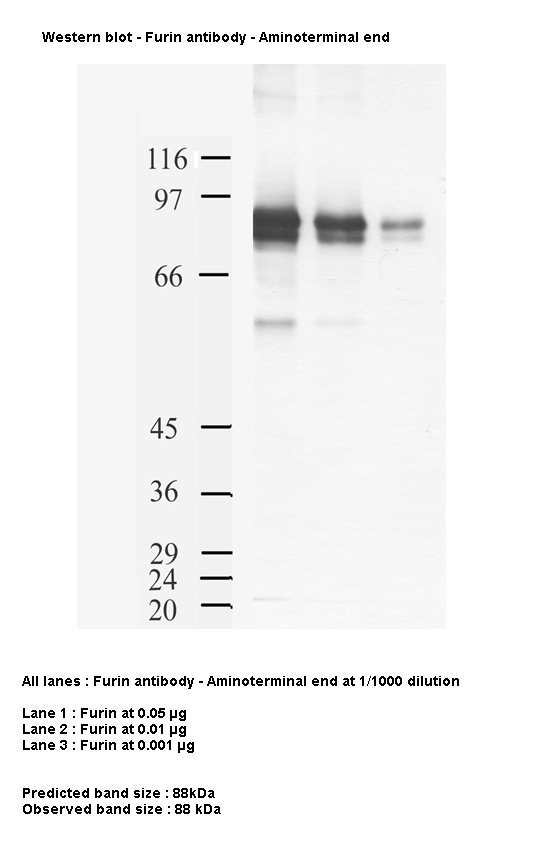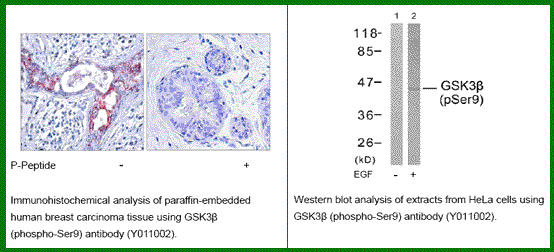Anti-GSK3ß (Phospho-Ser9) Antibody
| Cat. No. | Y011002 |
| Name | Anti-GSK3ß (Phospho-Ser9) Antibody |
| Clone | N/A |
| Category | Polyclonal Antibodies |
| Gene Name | Human GSK3β |
| Application | WB,IHC |
| Application Info | WB: 1:500~1:1000 IHC: 1:50~1:100 |
| Raised In | Rabbit |
| Clonality | Polyclonal |
| Immunogen | The antiserum was produced against synthesized phosphopeptide derived from human GSK3β around the phosphorylation site of serine 9 (T-T-SP-F-A). |
| Concentration | 1ug/ul |
| Recommended Dilutions | WB: 1:500~1:1000 IHC: 1:50~1:100 |
| Storage Buffer | phosphate buffered saline (without Mg2+ and Ca2+), pH 7.4, 150mM NaCl, 0.02% sodium azide and 50% glycerol. |
| Storage Condition | This product is stable for several weeks at 4° C as an undiluted liquid. Dilute only prior to immediate use. For extended storage, aliquot contents and freeze at -20° C or below. Avoid cycles of freezing and thawing. Expiration date is one (1) year from date of receipt. |
| Formulation | Liquid |
| Species Reactivity | Human,Mouse,Rat |
| Specificity | GSK3β (phospho-Ser9) antibody detects endogenous levels of GSK3β only when phosphorylated at serine 9. |
| Purity | The antibody was affinity-purified from rabbit antiserum by affinity-chromatography using epitope-specific phosphopeptide. The antibody against non-phosphopeptide was removed by chromatogramphy using non-phosphopeptide corresponding to the phosphorylation site. |
| Guarantee |
abm guarantees that all our Anti-GSK3ß (Phospho-Ser9) Antibody will perform as described on this product webpage, if this is not the case we will provide you with a one-time replacement at no extra cost. Documentation and explanation of experiment conducted will be required when submitting a claim for replacement. |
| Material Citation | If use of this material results in a scientific publication, please cite the material in the following manner: Applied Biological Materials Inc, Cat. No. Y011002 |
Print/Download Datasheet
Search CoA here
There are no Documents for this product yet!
There are no FAQs for this product yet!
- Zhao, S et al. "Effects of parafibromin expression on the phenotypes and relevant mechanisms in the DLD-1 colon carcinoma cell line" Asian Pac. J. Cancer Prev. 14:4249-54 (2013). PubMed: 23991985.
This product has no review yet.
{"id":1,"cat_no":"Y011002","old_cat_no":"Y011002","name":"Anti-GSK3\u0026szlig; (Phospho-Ser9) Antibody","category_id":57,"category_name":"Polyclonal Antibodies","frontend_category_id":91,"frontend_category_ids":"86,1,7,91","gene_id":89036,"gene_name":"Human GSK3\u03b2","gene_full_name":"","alias":null,"unit_quantity":"100 \u03bcg","accession_number":"","species_id":0,"species":"","application_id":"1,2","application":"WB,IHC","raised_in_id":0,"raised_in":"Rabbit","clonality_id":0,"clonality":"Polyclonal","antibody_type_id":0,"antibody_type":"Primary Antibody","tissue_id":0,"tissue":"","reactivity_id":"","reactivity":"","price":"319.0000","price_before_discount":"0.0000","keywords":"GSK3%A6%C2 Antibody, Primary GSK3%A6%C2 Antibodies, gggggg","invisible_search_keywords":"","filter_group_id":22,"filter_group_name":"Antibodies","filter_id":65,"filter_name":"Polyclonal Antibodies","search_filter_ids":"58,64","search_filter_keys":"58-64","temp_field":"46","customization":0,"filter_table_id":0,"filter_table_name":"","points_rule":6,"related_group_id":7,"url":"","operator":"","status":1,"need_remove":0,"document_sort":"","price_old":"285.0000","price2024":"299.0000","created_at":null,"updated_at":"2025-01-06 09:05:34","Confirmed":"Tony Confirmed","geo_price_before_discount":"0.00","geo_titer7_price_before_discount":"149.00","cate_url":"Polyclonal-Antibodies.html","frontendBreadcrumbs":[{"id":1,"pid":86,"name":"General Materials","page_id":27,"page_type":"App\\Models\\Category","href":null,"sort":1,"show_in_nav":1,"show_in_footer":1,"show_in_homepage":1,"has_children":1,"status":1,"is_service":0,"related_table":null,"created_at":null,"updated_at":null,"url_key":"general-materials.html","url":"general-materials.html"},{"id":7,"pid":1,"name":"Antibodies","page_id":23,"page_type":"App\\Models\\Category","href":null,"sort":7,"show_in_nav":1,"show_in_footer":1,"show_in_homepage":1,"has_children":1,"status":1,"is_service":0,"related_table":null,"created_at":null,"updated_at":null,"url_key":"antibodies.html","url":"antibodies.html"},{"id":91,"pid":7,"name":"Polyclonal Antibodies","page_id":57,"page_type":"App\\Models\\Category","href":null,"sort":12,"show_in_nav":1,"show_in_footer":1,"show_in_homepage":1,"has_children":0,"status":1,"is_service":0,"related_table":null,"created_at":null,"updated_at":null,"url_key":"Polyclonal-Antibodies.html","url":"Polyclonal-Antibodies.html"}],"price_flag":0,"builderURL":"","builderViewerURL":"","mapURL":"","viewerURL":"","builderType":"","productType":"App\\Models\\CatalogBaseAntibody","geo_price":"319.00","geo_price_symbol":"$319.00","category":{"id":57,"categories":"Polyclonal Antibodies","pid":23,"url_key":"Polyclonal-Antibodies.html","css":null,"wid":0,"breadcrumbs":"[{\u0022url\u0022:\u0022https:\/\/www.abmgood.com\/\u0022,\u0022title\u0022:\u0022Home\u0022},{\u0022url\u0022:\u0022https:\/\/www.abmgood.com\/antibodies.html\u0022,\u0022title\u0022:\u0022Antibodies\u0022},{\u0022url\u0022:\u0022https:\/\/www.abmgood.com\/Polyclonal-Antibodies.html\u0022,\u0022title\u0022:\u0022Monoclonal and Polyclonal Antibodies\u0022}]","breadcrumbsIdJson":"\u003Cscript type=\u0022application\/ld+json\u0022\u003E{\u0022@context\u0022:\u0022https:\/\/schema.org\u0022,\u0022@type\u0022:\u0022BreadcrumbList\u0022,\u0022itemListElement\u0022:[{\u0022@type\u0022:\u0022ListItem\u0022,\u0022position\u0022:1,\u0022name\u0022:\u0022Home\u0022,\u0022item\u0022:\u0022https:\/\/www.abmgood.com\/\u0022},{\u0022@type\u0022:\u0022ListItem\u0022,\u0022position\u0022:2,\u0022name\u0022:\u0022Antibodies\u0022,\u0022item\u0022:\u0022https:\/\/www.abmgood.com\/antibodies.html\u0022},{\u0022@type\u0022:\u0022ListItem\u0022,\u0022position\u0022:3,\u0022name\u0022:\u0022Monoclonal and Polyclonal Antibodies\u0022}]}\u003C\/script\u003E","breadcrumbsHtml":"\u003Cul class=\u0022abm-breadcrumb\u0022\u003E\u003Cli\u003E\u003Ca href=\u0022https:\/\/www.abmgood.com\/\u0022\u003EHome\u003C\/a\u003E\u003C\/li\u003E\u003Cli\u003E\u003Ca href=\u0022https:\/\/www.abmgood.com\/antibodies.html\u0022\u003EAntibodies\u003C\/a\u003E\u003C\/li\u003E\u003Cli class=\u0022active\u0022\u003EMonoclonal and Polyclonal Antibodies\u003C\/li\u003E\u003C\/ul\u003E","description":"\u003Ch2 class=\u0022abm-categories-title-h2\u0022\u003EPolyclonal Antibodies\u003C\/h2\u003E\n\u003Cdiv class=\u0022abm-container-fluid\u0022\u003E\n\u003Cdiv class=\u0022row\u0022\u003E\n\u003Cdiv class=\u0022col-xs-12\u0022 style=\u0022text-align: left; padding-bottom: 3em;\u0022\u003E\n\u003Cp\u003EPrimary antibodies are configured to recognize and bind unique regions (epitopes) that can in essence, be presented in the context of a broad range of bio-molecules. As one of the leading suppliers of antibodies worldwide, \u003Cstrong\u003Eabm\u003C\/strong\u003E provides \u0026gt;30,000 gene-specific antibodies in addition to the availability of both the monoclonal and polyclonal antibodies from a wide range of host sources (i.e. rabbit, mouse, donkey, goat).\u003C\/p\u003E\n\u003Cp\u003ESearch our \u003Ca href=\u0022\/searchPro?filters=64\u0022 rel=\u0022noopener\u0022\u003E\u003Cstrong\u003E\u003Cspan style=\u0022color: #e67e23;\u0022\u003Epolyclonal antibody collection\u003C\/span\u003E\u003C\/strong\u003E\u003C\/a\u003E below.\u003C\/p\u003E\n\u003Csection class=\u0022search-section\u0022\u003E\u003Cform action=\u0022\/searchPro\u0022 id=\u0022search-form\u0022 class=\u0022ready-to-use-search-form\u0022 data-hs-cf-bound=\u0022true\u0022\u003E\u003Cinput name=\u0022filters\u0022 readonly=\u0022readonly\u0022 type=\u0022hidden\u0022 value=\u002264\u0022 \/\u003E\n\u003Cdiv class=\u0022search-form-group\u0022 style=\u0022grid-template-columns: 10fr 2fr;\u0022\u003E\u003Cinput type=\u0022text\u0022 class=\u0022search-form-group-input\u0022 id=\u0022search-input\u0022 placeholder=\u0022Enter a gene name or gene symbol to search\u0022 name=\u0022query\u0022 style=\u0022border-left: none; border-radius: 5px 0 0 5px;\u0022 \/\u003E\u003Cbutton class=\u0022search-form-group-button\u0022 type=\u0022submit\u0022 id=\u0022search-button\u0022\u003E\u003Ci class=\u0022fa fa-search\u0022\u003E\u003C\/i\u003E\u003C\/button\u003E\u003C\/div\u003E\n\u003C\/form\u003E\u003C\/section\u003E\n\u003C\/div\u003E\n\u003C\/div\u003E\n\u003C\/div\u003E\n\u003Cp\u003E\n\u003Cscript\u003E\n const searchForm = document.getElementById(\u0027search-form\u0027);\n const appendWords = [\u0027polyclonal\u0027, \u0027antibody\u0027];\n if (searchForm) {\n searchForm.addEventListener(\u0027submit\u0027, e =\u003E {\n e.preventDefault();\n const originalQuery = searchForm.query \u0026\u0026 searchForm.query.value ? searchForm.query.value : \u0027\u0027;\n let searchQuery = originalQuery;\n for (const appendWord of appendWords) {\n const index = searchQuery.toLowerCase().indexOf(appendWord);\n if (index === -1) {\n searchQuery += ` ${appendWord}`;\n }\n }\n searchForm.query.value = searchQuery;\n searchForm.submit();\n searchForm.query.value = originalQuery;\n });\n }\n \u003C\/script\u003E\n\u003C\/p\u003E","meta_title":"Polyclonal Antibodies","meta_keywords":null,"meta_description":null,"deleted_at":null,"enable":"Y","parent_list":"23","table_name":null,"image":null,"independentPage":0,"top_type":1,"sort_order":410,"in_footer":1,"fid":23,"created_at":null,"updated_at":"2025-04-02 01:04:45"},"info":{"id":1,"cat_no_base":"Y011002","parent_id":1,"description":"","short_description":null,"special_price":null,"meta_title":null,"meta_keyword":"GSK3\u03b2 Antibody, Primary GSK3\u03b2 Antibodies","meta_description":"GSK3\u03b2 Antibody has been developed for the detection of GSK3\u03b2 protein via Western Blot or IHC.","image":"\/y\/0\/y011002.gif","small_image":"\/y\/0\/y011002.gif","thumbnail":"\/y\/0\/y011002.gif","tier_price":null,"minimal_price":null,"visibility":null,"url_key":"anti-gsk3-szlig-phospho-ser9-antibody-y011002","url_path":null,"msrp":null,"msrp_display_actual_price_type":"0","addtime":null,"caution":null,"storage_buffer":"phosphate buffered saline (without Mg2+ and Ca2+), pH 7.4, 150mM NaCl, 0.02% sodium azide and 50% glycerol.","absorption_wavelength":null,"application_info":"WB: 1:500~1:1000 IHC: 1:50~1:100","buffer":null,"cellular_localization":null,"china_pricing":"1365.0000","clone":"N\/A","concentration":"1ug\/ul","conjugation":null,"emission_wavelength":null,"formulation":"Liquid","guarantee":"\u003Cp\u003E\u003Cstrong\u003Eabm\u003C\/strong\u003E guarantees that all our Anti-GSK3\u0026szlig; (Phospho-Ser9) Antibody will perform as described on this product webpage, if this is not the case we will provide you with a one-time replacement at no extra cost. Documentation and explanation of experiment conducted will be required when submitting a claim for replacement.\u003C\/p\u003E","inventory_location":"Rack8-(BoxY011001-Y011016)","note":null,"recommended_dilutions":"WB: 1:500~1:1000 IHC: 1:50~1:100","source_catno":null,"source_price":null,"species_reactivity":"Human,Mouse,Rat","stabilizer":null,"storage_condition":"This product is stable for several weeks at 4\u00b0 C as an undiluted liquid. Dilute only prior to immediate use. For extended storage, aliquot contents and freeze at -20\u00b0 C or below. Avoid cycles of freezing and thawing. Expiration date is one (1) year from date of receipt.","supplier":"SAB Y01","trade_mark":null,"antibody_species_reactivity_te":null,"purity":"The antibody was affinity-purified from rabbit antiserum by affinity-chromatography using\r\nepitope-specific phosphopeptide. The antibody against non-phosphopeptide was removed\r\nby chromatogramphy using non-phosphopeptide corresponding to the phosphorylation site.","immunogen":"The antiserum was produced against synthesized phosphopeptide derived from human\nGSK3\u0026#946; around the phosphorylation site of serine 9 (T-T-SP-F-A).","specificity":"GSK3\u0026#946; (phospho-Ser9) antibody detects endogenous levels of GSK3\u0026#946; only when\nphosphorylated at serine 9.","isotype":null,"antibody_application":"570,549","product_quote":0,"internal_leadtime":"0","internal_note":null,"uniprot_number":null,"relevance":null,"price_original":null,"internal_supplier":null,"internal_product_note":null,"promotions":null,"recommend":null,"created_at":"2022-05-05 05:04:21","updated_at":"2023-02-23 18:11:30"},"seo":{"id":1042,"catalog_id":1,"catalog_type":"App\\Models\\CatalogBaseAntibody","url_key":"anti-gsk3-szlig-phospho-ser9-antibody-y011002.html","meta_title":null,"meta_keywords":"GSK3\u03b2 Antibody, Primary GSK3\u03b2 Antibodies","meta_description":"GSK3\u03b2 Antibody has been developed for the detection of GSK3\u03b2 protein via Western Blot or IHC.","created_at":"2022-09-23 06:48:21","updated_at":"2023-02-23 05:31:24"},"media":[{"id":116333,"parent_id":1,"parent_type":"App\\Models\\CatalogBaseAntibody","file_path":"\/y\/0\/y051644.jpg","title":null,"text":null,"file_type":"image","alt":null,"url":null,"position":1,"status":0,"entity_id_m2":217478,"sku_in_m2":"Y051644","value_id_m2":118995,"attribute_id":90,"created_at":"2022-07-19 04:36:22","updated_at":"2023-12-20 08:58:19"},{"id":111781,"parent_id":1,"parent_type":"App\\Models\\CatalogBaseAntibody","file_path":"\/y\/0\/y011002.gif","title":null,"text":null,"file_type":"image","alt":null,"url":null,"position":2,"status":0,"entity_id_m2":211780,"sku_in_m2":"Y011002","value_id_m2":112335,"attribute_id":90,"created_at":"2022-07-19 04:36:22","updated_at":"2023-12-20 08:58:19"}],"gene":{"entity_id":89036,"old_entity_id":null,"ncbi_id":null,"gene_id":null,"gene_name":"Human GSK3\u03b2","gene_full_name":null,"gene_symbol":null,"gene_description":null,"gene_common_name":null,"gene_taxname":null,"gene_accession_number_new":null,"gene_transcripts":null,"gene_transcripts_cds_accession_number":null,"gene_transcripts_cds_range":null,"gene_cds_size":null,"alias":null,"insert_size":null,"cds":null,"cds_info":null,"accession_number":null,"old_accession_number":null,"accession_number_new":null,"species":null,"list_of_species":null,"flag":9,"need_remove":0,"group":"#N\/A","created_at":"2022-12-07 06:32:12","updated_at":"2023-02-09 08:37:10"}}


